Germany culture 德国文化
- 格式:ppt
- 大小:2.42 MB
- 文档页数:35

德国文化的特点
1. 德国文化很讲究秩序呀!你看德国的街道、建筑布局,那都是整整齐齐的。
就好比一个精准运行的时钟,每一个零件都在自己的位置上发挥作用。
地铁站里大家也都安静有序地排队,这难道不令人佩服吗?
2. 德国文化特别重视质量呢!德国制造那可是响当当的呀!想想那些高品质的德国汽车、精密的仪器,那简直就是艺术品。
这不就像一位追求完美的工匠,精心雕琢每一个细节嘛!质量就是他们的骄傲呀,你能不被吸引吗?
3. 德国文化里的严谨真的绝了!他们做事情一丝不苟,规划起来详细得不得了。
就像搭建一座坚固的城堡,每一块砖头都要放得恰到好处才行。
连日常的生活安排都那么有条不紊,这种严谨不正是他们成功的关键吗?
4. 德国人的啤酒文化可太有意思啦!到了啤酒节,那场面热闹非凡。
大家开怀畅饮,欢声笑语,就如同一场盛大的狂欢派对。
一杯杯美味的啤酒下肚,那种快乐简直无法形容,你不想去体验一下吗?
5. 德国文化注重环保也是出了名的呀!看看他们的垃圾分类做得多细致,回收利用也搞得特别好。
这就像是爱护自己的家一样爱护着环境,多值得我们学习呀!
6. 还有德国的音乐文化也很棒哦!那些经典的音乐作品流传至今。
一场精彩的音乐会,能让你沉浸在音乐的海洋里,这不就是一场心灵的盛宴吗?德国文化真的太有魅力啦,让人忍不住想要深入了解和探索呀!
我觉得德国文化丰富多彩、独具特色,非常值得我们去欣赏和学习。
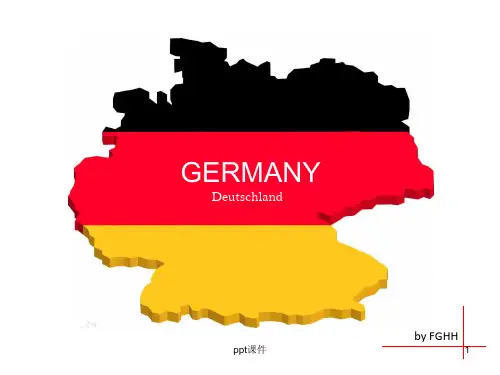
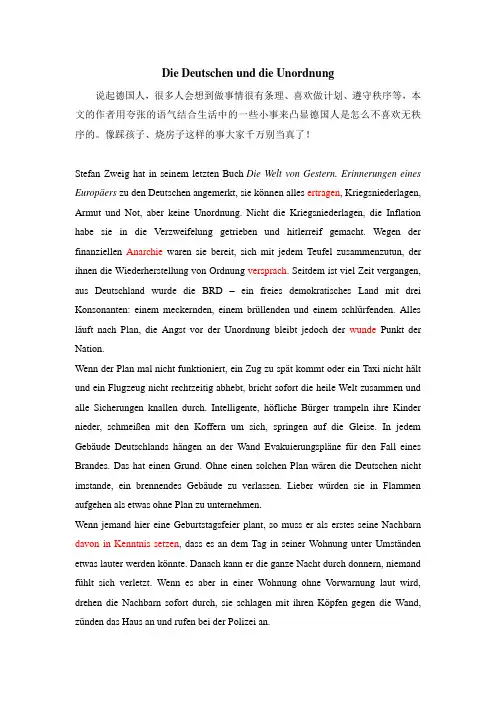
Die Deutschen und die Unordnung说起德国人,很多人会想到做事情很有条理、喜欢做计划、遵守秩序等,本文的作者用夸张的语气结合生活中的一些小事来凸显德国人是怎么不喜欢无秩序的。
像踩孩子、烧房子这样的事大家千万别当真了!Stefan Zweig hat in seinem letzten Buch Die Welt von Gestern. Erinnerungen eines Europäers zu den Deutschen angemerkt, sie können alles ertragen, Kriegsniederlagen, Armut und Not, aber keine Unordnung. Nicht die Kriegsniederlagen, die Inflation habe sie in die Verzweifelung getrieben und hitlerreif gemacht. Wegen der finanziellen Anarchie waren sie bereit, sich mit jedem Teufel zusammenzutun, der ihnen die Wiederherstellung von Ordnung versprach. Seitdem ist viel Zeit vergangen, aus Deutschland wurde die BRD –ein freies demokratisches Land mit drei Konsonanten: einem meckernden, einem brüllenden und einem schlürfenden. Alles läuft nach Plan, die Angst vor der Unordnung bleibt jedoch der wunde Punkt der Nation.Wenn der Plan mal nicht funktioniert, ein Zug zu spät kommt oder ein Taxi nicht hält und ein Flugzeug nicht rechtzeitig abhebt, bricht sofort die heile Welt zusammen und alle Sicherungen knallen durch. Intelligente, höfliche Bürger trampeln ihre Kinder nieder, schmeißen mit den Koffern um sich, springen auf die Gleise. In jedem Gebäude Deutschlands hängen an der Wand Evakuierungspläne für den Fall eines Brandes. Das hat einen Grund. Ohne einen solchen Plan wären die Deutschen nicht imstande, ein brennendes Gebäude zu verlassen. Lieber würden sie in Flammen aufgehen als etwas ohne Plan zu unternehmen.Wenn jemand hier eine Geburtstagsfeier plant, so muss er als erstes seine Nachbarn davon in Kenntnis setzen, dass es an dem Tag in seiner Wohnung unter Umständen etwas lauter werden könnte. Danach kann er die ganze Nacht durch donnern, niemand fühlt sich verletzt. Wenn es aber in einer Wohnung ohne V orwarnung laut wird, drehen die Nachbarn sofort durch, sie schlagen mit ihren Köpfen gegen die Wand, zünden das Haus an und rufen bei der Polizei an.Gleich nach der Geburt wird hier die Frage der möglichen künstlichen Beatmung im Alter diskutiert, sowie die in Frage kommenden Pflegestufen für die Zukunft, weil ja jedes Kind früher oder später alt sein wird, d.h. wenn alles nach Plan läuft. Um hier alt zu werden muss es aber sehr viele Formulare ausfüllen, unzählige Versicherungen abschließen und Einverständniserklärungen erteilen. Sobald ein Mensch hier schreiben bzw. unterschreiben kann, wird er jeden Tag seines Lebens ausfüllen und unterschreiben, ausfüllen und unterschreiben, ausfüllen und unterschreiben... Mein Kind geht ins Gymnasium, ich gebe ihm täglich eine unterschriebene Einverständniserklärung mit. …Damit Ihr Kind Benutzer der Bibliothek werden kann, um die Fotos Ihres Kindes in der Wandzeitung abdrucken zu dürfen, um am Schwimmunterricht teilnehmen zu dürfen…“ – nur zu: ich unterschreibe alles. Gestern bestellte ich in einer Eckkneipe eine volkstümliche Speise, den Strammen Max, ein mit Eier und Schinken belegtes Brot. …Aber bitte mit einer Scheibe Brot statt zwei“, präzisierte ich. …Eine Scheibe statt zwei? Wie? Eine statt zwei?“ Der Kellner dachte heftig nach, ob und wie es möglich wäre, einen Strammen Max mit einer Scheibe statt mit zweien zu machen, es ging beim besten Willen nicht, nein, es war …eine gastronomische Sackgasse“. Etwas verstört schaute er mich an. Natürlich zog ich sofort meine Bestellung zurück, der stramme Max soll so bleiben wie er immer ist: mit zwei Scheiben Brot und zwei Spiegeleiern drauf.Na und? - wird mancher Leser vielleicht sagen, was ist so schlecht an der Liebe zur Ordnung? Warum soll nicht alles nach Plan laufen? Das eigentliche deutsche Drama besteht darin, dass es so gut wie nie nach Plan läuft. Das Leben steckt voller Überraschungen, auch Mutter Natur handelt ungenau, der Wind weht mal von rechts und mal von links, die Sterne sind mal mehr und mal weniger am Himmel zu sehen und manchmal geht die Sonne später bzw. früher auf als erwartet, trotz der Zeitumstellung. Selbst wenn man jeden Tag zwei Mal eine Straβe fegt, bleibt immer irgendwo Müll liegen, irgendwelche Hunde laufen immer ohne Leine herum, und es gibt immer Menschen, die sich auf frisch gestrichene Bänke setzen, weil es ihnen Spaß macht.注释:ertragen V.t.忍耐,忍受Anarchie f.–n 混乱,无秩序versprechen V.i. 承诺,许诺wund Adj.擦伤的,创伤的;受伤害的,受创伤的jmdn. von etw. in Kenntnis setzen 告知某人某事zurückziehen V.t. 收回,撤回,取消Zeitumstellung f. –en 时间调整(为了节约能源,德国采用夏令时和冬令时制度。

德国的文化和传统德国是一个重要的欧洲国家,拥有独特的文化和传统。
德国的文化和传统极具影响力,不仅对本国的文化和社会发展产生了深远的影响,而且在国际文化交流中也起到了重要的作用。
本文将探讨德国的文化和传统,以及它们的影响和意义。
一、德国的文化德国的文化源远流长,距今已有几千年的历史。
德国的文化具有很强的多样性和包容性,这源于其历史上不同地区和民族的交织和融合。
例如,德国北部的汉萨联盟曾是欧洲最强大的贸易联盟之一,吸引了不同国家和民族的商人来往。
这一时期的文化交流和贸易往来,不仅促进了欧洲经济的繁荣,也为德国的文化融合打下了基础。
德国的文化以其丰富多彩的艺术活动和生活方式而著称,艺术和文化在德国历史上一直扮演着重要的角色。
例如,德国音乐以其广泛的流派和伟大的作曲家而闻名,其中最为著名的当属巴赫、贝多芬和莫扎特等。
此外,德国的文学也是世界文学史上不可或缺的一部分,其中最具代表性的当属歌德和席勒两位文学巨匠。
除此之外,德国的电影、舞蹈、剧场等也在世界范围内享有盛名。
德国的文化还体现在其饮食、建筑、艺术和手工艺等方面。
例如,德国的啤酒和香肠在国际上都享有盛誉,而德国建筑风格以其精致的细节和精美的设计而著称。
此外,德国的手工艺也是世界闻名的,如德国的玻璃制品、陶瓷工艺、钟表制造等。
总的来说,德国的文化具有丰富多彩的特点,它强调文化传承、保护和发扬光大,这种文化精神也一直影响着德国社会和文化发展。
二、德国的传统德国的传统继承和保护了许多古老而珍贵的文化元素,其中最典型的当属德国的民俗和节日。
德国的民俗和节日反映了德国人民的信仰、习惯和生活方式,它们也是德国文化的重要组成部分。
比如,德国的圣诞节是全球最重要的节日之一,许多圣诞节的传统如圣诞树、圣诞市场、圣诞卡片等都源于德国。
此外,德国的万圣节、复活节、古斯塔夫节等传统节日也吸引了众多人们的目光。
德国的民俗也独具特色,最典型的当属慕尼黑啤酒节和哥特林根篝火节。
慕尼黑啤酒节是全球最大的啤酒节,每年吸引了数百万游客前来观赏和参与。

德国文化的延续性和多样性德国文化是许多人心中的文化之一,也是世界上最具代表性的文化之一。
德国文化以其独特的历史、哲学、音乐、文学和艺术而闻名。
它的延续性和多样性是德国文化的魅力所在。
德国文化的延续性德国文化的延续性源于其历史,德国自古以来一直是欧洲文化的中心之一。
德国的文化历史可以追溯到古罗马帝国时期。
中世纪时期,德国的文化辉煌达到了巅峰,歌德、谢林及其他重要的文化人物为德国文化的发展作出了杰出的贡献。
接下来的几个世纪,德国的文化始终处于一种不断发展和改进的状态。
在这个过程中,艺术、音乐和哲学等领域不断涌现出杰出的人才,他们的作品对德国文化的影响和延续起到了至关重要的作用。
德国文化的多样性德国文化的多样性在很大程度上来自于其地理和民族背景。
德国国土辽阔,文化地域也有很大的不同。
南部的巴伐利亚地区以其文化自豪感和特色的节日而著名,同时还有美丽而著名的阿尔卑斯山脉。
西部的莱茵河流域地区是德国最重要的经济区,这里跨越了法国、比利时和荷兰三个国家,文化也受到各种文化的影响。
东部的勃兰登堡和波兰接壤,这里的文化受到了斯拉夫文化和东欧文化的影响。
德国北部则以海洋文化、小城镇和美丽的海岸线而闻名。
这种地域多样性导致了德国文化的丰富多彩,无法归纳为单一的传统或风格。
德国文化的多元性特征还延伸到德国人口的多样性。
德国拥有许多不同的民族和国家的人民,其中包括土著民族,以及近年来随着移民潮涌入而来的外国人。
这种多样性使得德国文化具有更加开放、宽容和包容性。
德国文化的流行与传承德国文化的流行与传承在当代也十分重要。
在音乐领域,德国有着丰富的乐曲和作曲家。
贝多芬、巴赫、莫扎特等德国作曲家到今天仍受到全球音乐爱好者的喜爱。
在文学领域,德国文学跨越了几个世纪,从浪漫主义到现代主义,德国文化以其独特的创造力和思维方式揭示了所有人可以分享的智慧。
当代的德国文化精英如诗人草莽、小说家哈克、奥黛丽年轻等都取得了显著的成就,受到了广泛的关注。
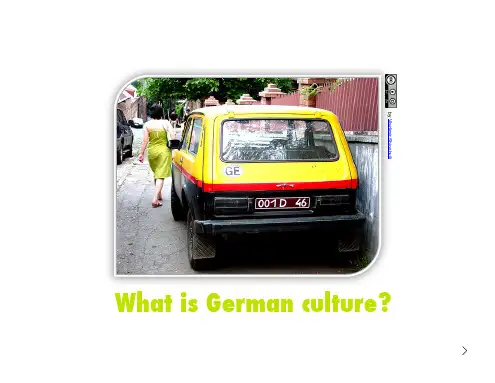

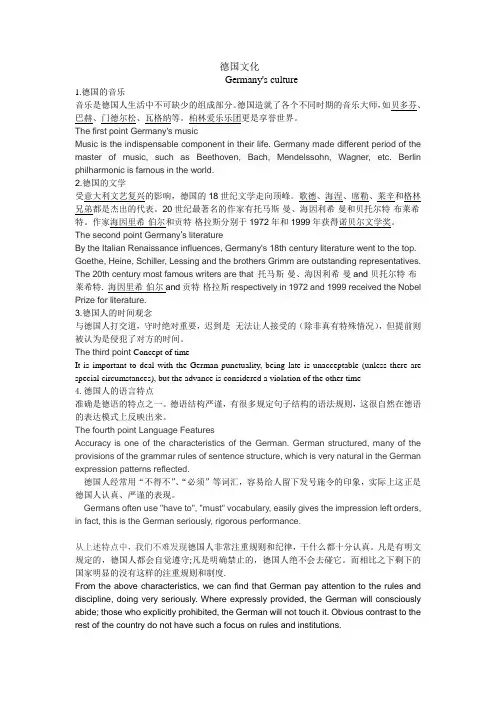
德国文化Germany's culture1.德国的音乐Music is the indispensable component in their life. Germany made different period of the master of music, such as Beethoven, Bach, Mendelssohn, Wagner, etc. BerlinBy the Italian Renaissance influences, Germany's 18th century literature went to the top. Goethe, Heine, Schiller, Lessing and the brothers Grimm are outstanding representatives. The 20th century most famous writers are that 托马斯·曼、海因利希·曼and贝托尔特·布莱希特.海因里希·伯尔and贡特·格拉斯respectively in 1972 and 1999 received the Nobel Prize for literature.3.德国人的时间观念与德国人打交道,守时绝对重要,迟到是无法让人接受的(除非真有特殊情况),但提前则被认为是侵犯了对方的时间。
The third point Concept of timeIt is important to deal with the German punctuality, being late is unacceptable (unless there are special circumstances), but the advance is considered a violation of the other time4.德国人的语言特点准确是德语的特点之一。

德国的特色文化和风情德国是一个拥有丰富文化和独特风情的国家。
它的特色文化可以从以下几个方面介绍。
1.建筑文化:德国以其精美的建筑而闻名。
从中世纪的城堡和教堂到现代化的建筑,德国的建筑风格多种多样。
例如,科隆大教堂是德国最著名的哥特式建筑之一,慕尼黑的新天鹅堡则展示了浪漫主义建筑的精髓。
此外,德国还拥有许多历史悠久的城市,如海德堡、罗滕堡和法兰克福,这些城市保留了许多古老的建筑和街道,让人们感受到历史的魅力。
2.音乐文化:德国是音乐的故乡,许多著名的古典音乐作曲家都来自德国,如巴赫、贝多芬和莫扎特。
德国有着世界闻名的音乐学院和交响乐团,如柏林爱乐乐团和莱比锡布商乐团。
此外,德国还举办着一些世界知名的音乐节,如巴伐利亚音乐节和莱茵河古典音乐节。
无论是古典音乐还是摇滚乐,德国在音乐方面都有着丰富的传统和创造力。
3.文学和哲学:德国有着辉煌的文学和哲学传统。
著名的德国作家包括歌德、谢林、荷尔德林和哈耶克。
经典的德国文学作品,如《浮士德》和《罗密欧与朱丽叶》,被世界各地的读者所熟知。
德国的哲学家也产生了许多重要的思想家,如康德、黑格尔和尼采。
他们的思想对整个西方哲学都产生了深远影响。
4.啤酒和美食文化:德国人非常爱喝啤酒,因此德国也成为世界啤酒之乡。
德国的啤酒文化源远流长,有许多种类的啤酒可供选择。
慕尼黑的啤酒节是世界上最大的啤酒节之一,吸引着来自世界各地的游客。
此外,德国还有许多传统的美食,如香肠、猪脚和苹果派。
这些美食代表了德国人的饮食习惯和独特的口味。
5.节日庆典:德国有许多传统的节日庆典,如圣诞节和复活节。
圣诞节期间,德国的城市和小镇会装饰成梦幻般的圣诞景象,人们会去参观圣诞市场和购买手工艺品和圣诞美食。
德国的复活节庆典也非常独特,人们会互相赠送彩蛋和参加传统的游戏活动。
此外,德国还举办一些独特的节日,如慕尼黑啤酒节和斯图加特啤酒节,这些节日吸引了世界各地的游客。
总之,德国以其建筑、音乐、文学、美食和节日庆典而闻名于世。
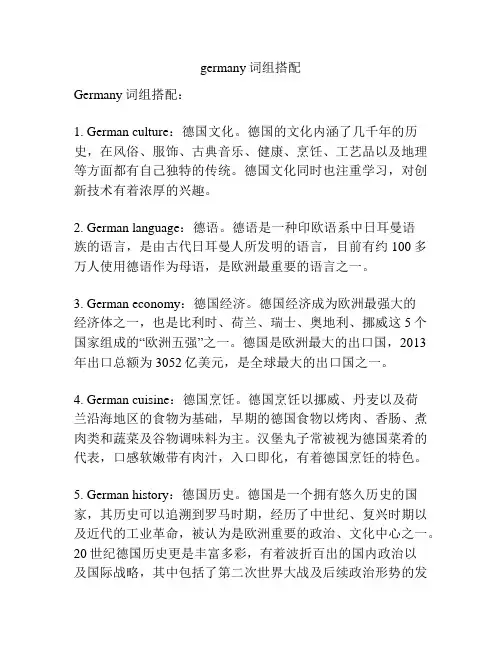
germany词组搭配Germany词组搭配:1. German culture:德国文化。
德国的文化内涵了几千年的历史,在风俗、服饰、古典音乐、健康、烹饪、工艺品以及地理等方面都有自己独特的传统。
德国文化同时也注重学习,对创新技术有着浓厚的兴趣。
2. German language:德语。
德语是一种印欧语系中日耳曼语族的语言,是由古代日耳曼人所发明的语言,目前有约100多万人使用德语作为母语,是欧洲最重要的语言之一。
3. German economy:德国经济。
德国经济成为欧洲最强大的经济体之一,也是比利时、荷兰、瑞士、奥地利、挪威这5个国家组成的“欧洲五强”之一。
德国是欧洲最大的出口国,2013年出口总额为3052亿美元,是全球最大的出口国之一。
4. German cuisine:德国烹饪。
德国烹饪以挪威、丹麦以及荷兰沿海地区的食物为基础,早期的德国食物以烤肉、香肠、煮肉类和蔬菜及谷物调味料为主。
汉堡丸子常被视为德国菜肴的代表,口感软嫩带有肉汁,入口即化,有着德国烹饪的特色。
5. German history:德国历史。
德国是一个拥有悠久历史的国家,其历史可以追溯到罗马时期,经历了中世纪、复兴时期以及近代的工业革命,被认为是欧洲重要的政治、文化中心之一。
20世纪德国历史更是丰富多彩,有着波折百出的国内政治以及国际战略,其中包括了第二次世界大战及后续政治形势的发展。
6. German education:德国教育。
德国教育系统以民主治理为基本框架,保证每个孩子都能够以最好的条件得到高质量的教育。
德国学校教育理念是宽容、尊重以及分析,学生也有更多的自由去探索不同的主题。
德国更重视学生的思考能力及创造性的思维,从而使其在知识方面及技能方面能够获得更深入的发展。
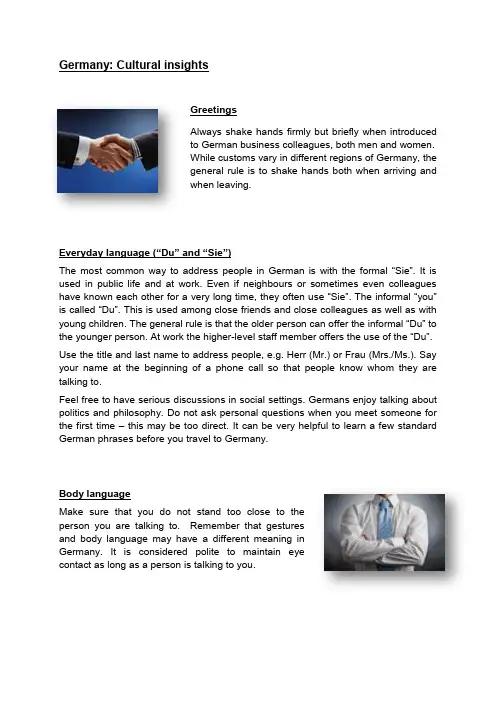
Germany: Cultural insightsGreetingsAlways shake hands firmly but briefly when introducedto German business colleagues, both men and women.While customs vary in different regions of Germany, thegeneral rule is to shake hands both when arriving andwhen leaving.Everyday language (“Du” and “Sie”)The most common way to address people in German is with the formal “Sie”. It is used in public life and at work. Even if neighbours or sometimes even colleagues have known each other for a very long time, they often use “Sie”. The informal “you” is called “Du”. This is used among close friends and close colleagues as well as with young children. The general rule is that the older person can offer the informal “Du” to the younger person. At work the higher-level staff member offers the use of the “Du”.Use the title and last name to address people, e.g. Herr (Mr.) or Frau (Mrs./Ms.). Say your name at the beginning of a phone call so that people know whom they are talking to.Feel free to have serious discussions in social settings. Germans enjoy talking about politics and philosophy. Do not ask personal questions when you meet someone for the first time – this may be too direct. It can be very helpful to learn a few standard German phrases before you travel to Germany.Body languageMake sure that you do not stand too close to theperson you are talking to. Remember that gesturesand body language may have a different meaning inGermany. It is considered polite to maintain eyecontact as long as a person is talking to you.PunctualityPunctuality is very important in Germany. Be on timefor every appointment, whether for business or socialengagements. It can be offensive to a German if youarrive too late, especially when you are in asubordinate position. Avoid skipping a scheduledbusiness meeting or cancelling it at the last moment.DiningBefore starting to eat, wait until someone (usuallythe host), or you yourself, says “Guten Appetit”.Try not to eat with your fingers except when eatingbread or biscuits.Placing one’s knife and fork side by side indicatesthat you are done with your meal. If you place themcrossed, it means you haven't finished with themeal.It is quite common to choose your own table in a restaurant (unless it is a very expensive restaurant or very full where you have to wait to be seated). In smaller, crowded cafes or bistro-type restaurants, it is possible to share a table with people you don’t know.In most German restaurants you have to order still or sparkling water and pay for it. It is not common to serve tap water. However, you may find restaurants which are willing to do so. When drinking beer or wine, people tend to raise or clink their glasses together and say “Prost” or “zum Wohl” and look each other in the eye when doing so.Polite gesturesIn Germany it is common to give a waiter or waitress atip of 5%-10%.If you are invited to a German home, remember totake a small gift for the host. When you bring a friendor colleague flowers, make sure not to give them redroses which symbolize love, or lilies which are usedfor funerals.SafetyThere are strict traffic rules in Germany, so do not jump a redtraffic light when driving. If a policeman sees you or you getcaught by a hidden camera, you will be fined. Try also not tocross the street when the pedestrian lights are red, especiallywhen there are small children at the crossing. Avoid walking orparking your car on the bike lane (it is marked red for areason).BusinessDo not be surprised when Germans knock on the table instead of applauding after a presentation or business meeting.Dress formally for business occasions.Good to knowMany restaurants don’t take cr edit cards.Shops, banks and chemists are normally closed onSundays in Germany. In big cities, supermarkets openearly and close at 8 or 10pm on weekdays and onSaturdays. Some of the smaller shops may close at 6 or7 pm. Department stores like “Kaufhof” are open from 9am until 8 pm.Banks have very specific opening hours which vary frombank to bank. Most banks are open until 6 pm onThursdays.Chemists are open on Saturdays only until 1 pm (max. 4pm). However, there are always one or two chemists open on Sundays and public holidays. You can ask your local chemist for a calendar which shows you the chemists you can contact in an emergency.If you are staying for a long period in Germany, become acquainted with the rules for garbage separation (paper, bottle and plastic banks).It is a constitutional right in Germany that nobody should be discriminated on the basis of gender, religion, class, sexual preference or race.Basic vocabularyApotheke。
德国文化Germany is a country with a rich and diverse cultural heritage that has produced some of the world's most renowned thinkers, artists, and innovators. The German culture is known for its passion for life, hospitality, and a strong sense of community.In terms of history, Germany has played a crucial role in European affairs for centuries. The country's rich history is reflected in its architecture, art, and music, which range from medieval cathedrals to modern artworks. Germany's cultural landscape is also enriched by the presence of various ethnic groups and traditions that have shaped the country's cultural identity.The German language, one of the most widely spoken languages in the world, is an integral part of German culture. The language is known for its precision, logic, and rich vocabulary, which have influenced many languages around the globe. Germans are also known for their love of music,especially classical music, and many renowned composers such as Bach, Beethoven, and Mozart have ties to Germany.Another important aspect of German culture is its hospitality and the kindness of its people. Germans value socializing and often gather for festivals, concerts, and other cultural events. The country's cuisine is also not to be missed, with dishes such as schnitzel, sauerkraut, and beer being some of the most famous German specialties.Finally, Germany is also known for its contributions to science and technology. The country has produced some of the greatest minds in these fields, including Albert Einstein, Max Planck, and many others. This has led to groundbreaking innovations in areas such as medicine, engineering, and renewable energy.In conclusion, the German culture is a rich and diverse tapestry that reflects the country's rich history, its people's hospitality and hardworking nature, and its contributions to science and technology. This culture has left a lasting mark on the world and continues to inspire people from all walks of life.翻译如下:德国是一个拥有丰富多元文化的国家,有着世界上享有盛名思想家、艺术家和发明家。
德国文化的代表词
1、强调民主、自由
这主要是受了整个欧洲传统文化的熏陶,德国也不例外。
大家不要以为曾经遭受法西斯统治的德国人不像法国人那样强调民主、自由,恰恰相反,饱受专制之苦的德国人更渴望民主和自由,所以德国文化呈现出这一特色。
2、保守主义
德国文化中给人最突出的印象就是严谨,甚至是刻板。
无论是德国的政治制度,其他管理制度,德国企业生产的产品、德国的建筑、德国人的着装、德国人的性格特征,都透露着严谨的特点。
正是因为严谨,德国文化中很注重法制和制度的建设。
德国人无论做什么事情都讲究规则。
这些就是德国文化保守主义的外在表现。
3、勤奋节俭
这一点和德国文化严谨刻板的特点几乎是一脉相承的。
谈到这个特点,给大家举一个例子,一名中国记者采访德国总理,结束采访正好是吃午饭的时间,总理请他共进午餐。
到了餐厅,就他们俩人,每人点了一份自己的食物。
德国总理点了一份鱼,吃完后,还将鱼汁吃得干干净净。
4、理性主义
德国文化的又一特色是它的理性主义。
要是没有理性,德国就不会出这么多对人类思想史有着重要影响的哲学家了。
如:黑格尔、费尔巴哈、马克思等,都是德国人。
他们的思想是受德国文化
中理性主义的影响。
介绍德国的文化(精选3篇)以下是网友分享的关于介绍德国的文化的资料3篇,希望对您有所帮助,就爱阅读感谢您的支持。
篇一德式西餐德国以其拥有世界上种类最繁多的香肠而闻名,每餐必有啤酒或白葡萄酒。
德国菜的特点是甜食、酸食和奶制品较多,生菜品种多样,酸椰菜烩猪肘、黑啤烩牛肉就是德式的代表菜肴。
德国人对饮食并不讲究,喜吃水果、奶酪、香肠、酸椰菜、土豆沙拉等,不求浮华,只求实惠营养,首先发明自助快餐。
德国人喜喝啤酒,每年的慕尼黑啤酒节大约要消耗掉100万公升啤酒。
因为要吃得温文而雅,又要讲究情调气氛,所以西餐最适宜小资的情侣们来用餐。
一些深圳经营西餐的老板本身就很小资,他们的西餐厅也尽显小资本色。
在这样的小资西餐厅里用餐,你可以预先设计———上什么菜、放什么背景音乐、摆什么台布、插什么花束、大屏幕投影仪放一段什么片子;你可以提要求———点上温馨的烛火、留下纪念的照片、让侍者适时为她(他)送上你预先准备好的惊喜礼物……无论是节日还是平常的傍晚,西餐厅里总有你演绎不尽的花样年华。
德国美食【美食篇】啤酒的国度坐在具有传统特色的古堡式餐馆中,要上一份杜松子酱汁,外加填梨子、油炸马铃薯子,再配上菊苣核桃仁色拉,一杯葡萄……有人说天堂里最好的厨师是法国人,地狱里最好的厨师是德国人。
此话虽过于夸张,但多少能反映出德国人不会吃的事实。
德国人讲求营养,而不是烹调艺术,所以有人说德国的饭菜无非清煮、白炖加烤制。
不过今日德国的餐饮业可以说是同际风味大荟萃,在此可品尝到世界各国的美味佳肴,德国菜也己不仅仅是白炖猪肘子加酸菜了。
现在的德国厨师善于吸收其他外来饮食特色,在博采亚、欧、美众家烹调特色的基础上,也可做出美味可口佳肴。
但是说到能标志德国,就不能不提香肠和啤酒等这类德国饮食了。
香肠德国人是名副其实的“大块吃肉、大口喝酒”的民族--吃猪肉喝啤酒。
德国人每人每年的猪肉消耗量为65公斤,居世界首位。
由于偏好猪肉,大部分有名的德国菜都是猪肉制品。
德国文化史起源的特点德国文化是欧洲文化中一个重要的组成部分,其发展始于古代,并随着历史的发展而不断变化。
从多方面来讲,德国文化史起源的特点表现在宗教、语言、音乐、绘画等艺术领域,这些特点结合在一起构成了德国文化史的独特性。
首先,德国文化史起源的宗教方面,德国大多数人信奉基督教,尽管真正开始确立基督教信仰是在中世纪六七百年发生的,而此前的古代德国人则是比较老祖宗的信仰。
其中,德国古代祖先的拜神和迷信多达600个,其中最有名的就是哈尔接(Wodan)。
此外,像克拉克人(Charlemagne)、奥斯曼帝国(Ottoman Empire)等少数民族的文化对德国古代宗教的影响也是不可忽视的。
其次,德国文化史起源的语言方面,德国的语言有德语和拉丁语两种,德国语是德国人使用的官方语言。
德国语起源于古代拉丁语,最初是古老的日耳曼语,经过中世纪改良而形成现代德语。
此外,拉丁语也是德国文化史起源时期最主要的宗教文字,贡献了很大的一部分文化遗产。
第三,德国文化史起源的音乐方面,德国有着悠久的音乐史,可以追溯到公元前100年。
从中可以清楚的看出德国当时的社会结构、宗教信仰以及丰富的文化积淀。
德国的音乐文化也深受古罗马、希腊和中世纪的影响,这就是德国音乐的深刻和独特之处。
此外,德国文化史起源的绘画方面,在中世纪,德国绘画以神学和宗教信仰为主要主题,德国古典绘画以莫兰德(Albrecht Durer)及其他文艺复兴时期大师们的作品最为显著,其风格以精细且精致的细节而闻名于世。
最后,德国文化史起源的文学方面,德国的文学文化的起源可以追溯到古代。
其中最著名的作品包括《神曲》(Nibelungenlied)、《圣书》(Die Sage)等,其中《神曲》一书,特别是有名的《尼伯龙根曲》,这本书表达了古老的德意志文化,展现了古老神话中许多传统的价值观。
综上所述,德国文化史起源的特点无疑是宗教、语言、音乐、绘画、文学等多方面的融合。